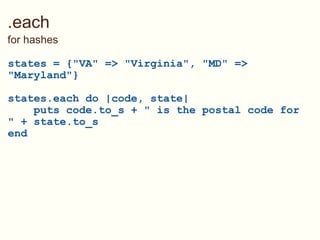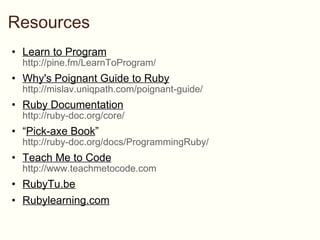MITH Digital Dialogues: Intro to Programming for Humanists (with Ruby)
- 1. A Humanist's Introduction to Programming (with Ruby) Wayne Graham & Joe Gilbert MITH, Oct. 19, 2010
- 2. What does that mean? (We're still figuring it out.)
- 3. Why teach programming to humanities scholars?
- 4. Jean Bauer Early American Foreign Service Database
- 5. Mapping Taqwacore: the Kominas
- 6. Why program? Express complex logic or relationships Perform computations Do things that take a long time or are difficult for humans to do (counting, comparing, repeating, graphing)
- 7. Why program? "when you don't create things, you become defined by your tastes rather than ability. your tastes only narrow & exclude people. so create." why the lucky stiff (@_why)
- 8. What is a programming language? An artificial language with a limited purpose A means of expressing computations (math) and algorithms (logic)
- 9. What is a programming language? ..like human languages in some ways! Syntax (form) Semantics (meaning) signs /words (variables, symbols, numbers, strings) expressions narrative ("flow," decisions, conditions, loops) complex entities (methods, structures, & objects)
- 10. Why Ruby? General purpose Object-oriented Usable locally or over the web English-like syntax and useful built-in features "Fun" to write Other commonly used languages: C, C++, Java, PHP, Python, JavaScript, ActionScript
- 11. "...trying to make Ruby natural, not simple." Yukihiro Matsumoto aka "Matz"
- 12. Why not Ruby? Not as easy to run on the web as PHP (or JavaScript) Used less often than PHP, and major platforms (WordPress, Drupal, Omeka) use PHP Ruby isn't Rails Object-oriented languages are conceptually difficult to grasp
- 13. What we will cover What kinds of information do we use in programs? How can we store and reuse information? How can we describe collections of information? What operations can we perform with information? How can we repeat steps? What if we only want to do things under certain conditions?
- 14. What we won't cover Building a database driven website Design patterns Testing code Inheritance Software design Modules Mixins Procs Lambdas Coercion (Monkey Patching)
- 15. Try it out! irb http://www.ruby-lang.org/ http://tryruby.org/ http://rubyinstaller.org/
- 16. We work with a few basic types of information Numbers like 1, 4000, -33.3 Text , including characters , words , sentences , and paragraphs
- 17. Types of information numbers, letters, boolean values integers: 4 , 1040 , -55 , 9999 floating-point numbers: 1.1 , 0.444 , 9999.0001 , -3.33 text (strings): "a" , 'cat' , "The quick brown fox jumped over the lazy dogs." , '8 keys', '7’ boolean (yes or no?): true , false
- 18. Variables "words" that hold information > the_lonliest_number = 1 => 1 > truth = "beauty" => "beauty"
- 19. Collections
- 20. Collections text, numbers...collections? Array: > presidents = ["Jefferson", "Madison", "Monroe"] => ["Jefferson", "Madison", "Monroe"] presidents[0] = "Jefferson", presidents[1] = "Madison", etc. Associative array ("hash"): > states = {"VA" => "Virginia", "MD" => "Maryland"} => {"VA" => "Virginia", "MD" => "Maryland"} states["VA"] = "Virginia", states["MD"] = "Maryland"
- 21. Operators arithmetic and more my_variable = 5 my_other_variable = "hi" > my_variable + 2 => 7 > my_variable * 3 => 15 > my_other_variable + " there!" => "hi there!" > presidents = presidents + ["Washington"] => ["Jefferson", "Madison", "Monroe", "Washington"] > presidents = presidents - ["Washington"] => ["Jefferson", "Madison", "Washington"] What happens with presidents * 2 ?
- 22. Type casting duck typing and type casting Quotes are meaningful > my_favorite_number = '2' => "2" > my_favorite_number + 2 TypeError: can't convert Fixnum into String > my_favorite_number.to_i + 2 => 4
- 23. Special Symbols math operators + addition (and concatenation) - subtraction / division * multiplication assignment operators = assign a value += add, then assign a value other operators equivalence, non-equivalence, boolean (and, or, etc.)
- 24. Printing things to the screen puts "Doctor Who" puts tardis puts doctors[0] puts doctors["David Tennant"] puts "My favorite episode is " + best_episode
- 25. Do something! Store your street address, city, state, and zip code in variables (or even better, a hash!), then print them in the usual format: Joseph Gilbert 160 McCormick Road Charlottesville, VA 22902 address = {'name' => 'Joseph Gilbert', 'street' => '160 McCormick Road', 'city' => 'Charlottesville', 'state' => 'VA', 'zip' => '22902'} puts address['name'] puts address['street'] puts address['city'] + ', ' + address['state'] + ' ' + address['zip']
- 26. Repeating yourself > puts presidents[0] Jefferson =>nil > puts presidents[1] Madison => nil > puts presidents[2] Monroe => nil this isn't fun or efficient!
- 27. Repetition: "iterating" with each > presidents.each do |president| > puts president > end Jefferson Madison Monroe => ["Jefferson", "Madison", "Monroe"]
- 28. .each for hashes states = {"VA" => "Virginia", "MD" => "Maryland"} states.each do |code, state| puts code.to_s + " is the postal code for " + state.to_s end
- 29. Do Something, pt. 2 Create a collection of these authors and the year they passed away; print the collection in the following format: Charles Dickens passed away in 1870. Charles Dickens, 1870 William Thackeray, 1863 Anthony Trollope, 1882 Gerard Manley Hopkins, 1889 authors = {"Charles Dickens" => "1870", "William Thackeray" => "1863", "Anthony Trollope" => "1882", "Gerard Manley Hopkins" => "1889"} authors.each do |author, year| puts author.to_s + " passed away in " + year.to_s end
- 30. Resources Learn to Program http://pine.fm/LearnToProgram/ Why's Poignant Guide to Ruby http://mislav.uniqpath.com/poignant-guide/ Ruby Documentation http://ruby-doc.org/core/ “ Pick-axe Book ” http://ruby-doc.org/docs/ProgrammingRuby/ Teach Me to Code http://www.teachmetocode.com RubyTu.be Rubylearning.com
Editor's Notes
- #18: characters and words (strings) sometimes two different things, depending on language
- #22: "Doing stuff" usually doesn't change the variables used. You'd need to use write things like new_variable = my_variable + 2 or my_variable = my_variable + 2 to use this value later.
- #26: address = {'name' => 'Joseph Gilbert', 'street' => '160 McCormick Road', 'city' => 'Charlottesville', 'state' => 'VA', 'zip' => '22902'} puts address['name'] puts address['street'] puts address['city'] + ', ' + address['state'] + ' ' + address['zip']
- #30: authors = {"Charles Dickens" => "1870", "William Thackeray" => "1863", "Anthony Trollope" => "1882", "Gerard Manley Hopkins" => "1889"} authors.each do |author, year| puts author.to_s + " passed away in " + year.to_s end authors.each do |author, year| puts author.to_s + " passed away in " + year.to_s endauthors = {"Charles Dickens" => "1870", "William Thackeray" => "1863", "Anthony Trollope" => "1882", "Gerard Manley Hopkins" => "1889"} authors.each do |author, year| puts author.to_s + " passed away in " + year.to_s endauthors = {"Charles Dickens" => "1870", "William Thackeray" => "1863", "Anthony Trollope" => "1882", "Gerard Manley Hopkins" => "1889"} authors.each do |author, year| puts author.to_s + " passed away in " + year.to_s endauthors = {"Charles Dickens" => "1870", "William Thackeray" => "1863", "Anthony Trollope" => "1882", "Gerard Manley Hopkins" => "1889"} authors.each do |author, year| puts author.to_s + " passed away in " + year.to_s end





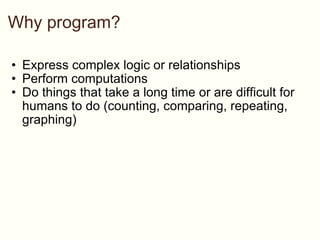





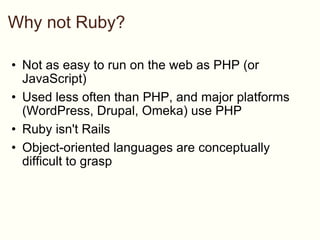

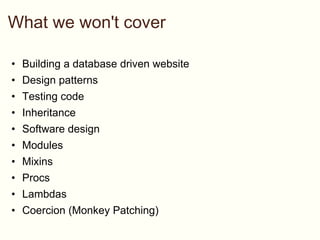
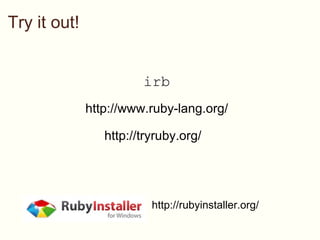
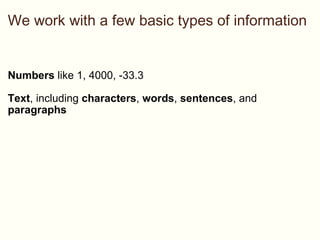


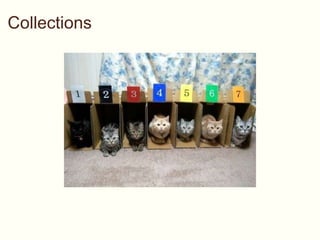
![Collections text, numbers...collections? Array: > presidents = ["Jefferson", "Madison", "Monroe"] => ["Jefferson", "Madison", "Monroe"] presidents[0] = "Jefferson", presidents[1] = "Madison", etc. Associative array ("hash"): > states = {"VA" => "Virginia", "MD" => "Maryland"} => {"VA" => "Virginia", "MD" => "Maryland"} states["VA"] = "Virginia", states["MD"] = "Maryland"](https://image.slidesharecdn.com/mithprogrammingforhumanists-101020150634-phpapp01/85/MITH-Digital-Dialogues-Intro-to-Programming-for-Humanists-with-Ruby-20-320.jpg)
![Operators arithmetic and more my_variable = 5 my_other_variable = "hi" > my_variable + 2 => 7 > my_variable * 3 => 15 > my_other_variable + " there!" => "hi there!" > presidents = presidents + ["Washington"] => ["Jefferson", "Madison", "Monroe", "Washington"] > presidents = presidents - ["Washington"] => ["Jefferson", "Madison", "Washington"] What happens with presidents * 2 ?](https://image.slidesharecdn.com/mithprogrammingforhumanists-101020150634-phpapp01/85/MITH-Digital-Dialogues-Intro-to-Programming-for-Humanists-with-Ruby-21-320.jpg)


![Printing things to the screen puts "Doctor Who" puts tardis puts doctors[0] puts doctors["David Tennant"] puts "My favorite episode is " + best_episode](https://image.slidesharecdn.com/mithprogrammingforhumanists-101020150634-phpapp01/85/MITH-Digital-Dialogues-Intro-to-Programming-for-Humanists-with-Ruby-24-320.jpg)
![Do something! Store your street address, city, state, and zip code in variables (or even better, a hash!), then print them in the usual format: Joseph Gilbert 160 McCormick Road Charlottesville, VA 22902 address = {'name' => 'Joseph Gilbert', 'street' => '160 McCormick Road', 'city' => 'Charlottesville', 'state' => 'VA', 'zip' => '22902'} puts address['name'] puts address['street'] puts address['city'] + ', ' + address['state'] + ' ' + address['zip']](https://image.slidesharecdn.com/mithprogrammingforhumanists-101020150634-phpapp01/85/MITH-Digital-Dialogues-Intro-to-Programming-for-Humanists-with-Ruby-25-320.jpg)
![Repeating yourself > puts presidents[0] Jefferson =>nil > puts presidents[1] Madison => nil > puts presidents[2] Monroe => nil this isn't fun or efficient!](https://image.slidesharecdn.com/mithprogrammingforhumanists-101020150634-phpapp01/85/MITH-Digital-Dialogues-Intro-to-Programming-for-Humanists-with-Ruby-26-320.jpg)
![Repetition: "iterating" with each > presidents.each do |president| > puts president > end Jefferson Madison Monroe => ["Jefferson", "Madison", "Monroe"]](https://image.slidesharecdn.com/mithprogrammingforhumanists-101020150634-phpapp01/85/MITH-Digital-Dialogues-Intro-to-Programming-for-Humanists-with-Ruby-27-320.jpg)
